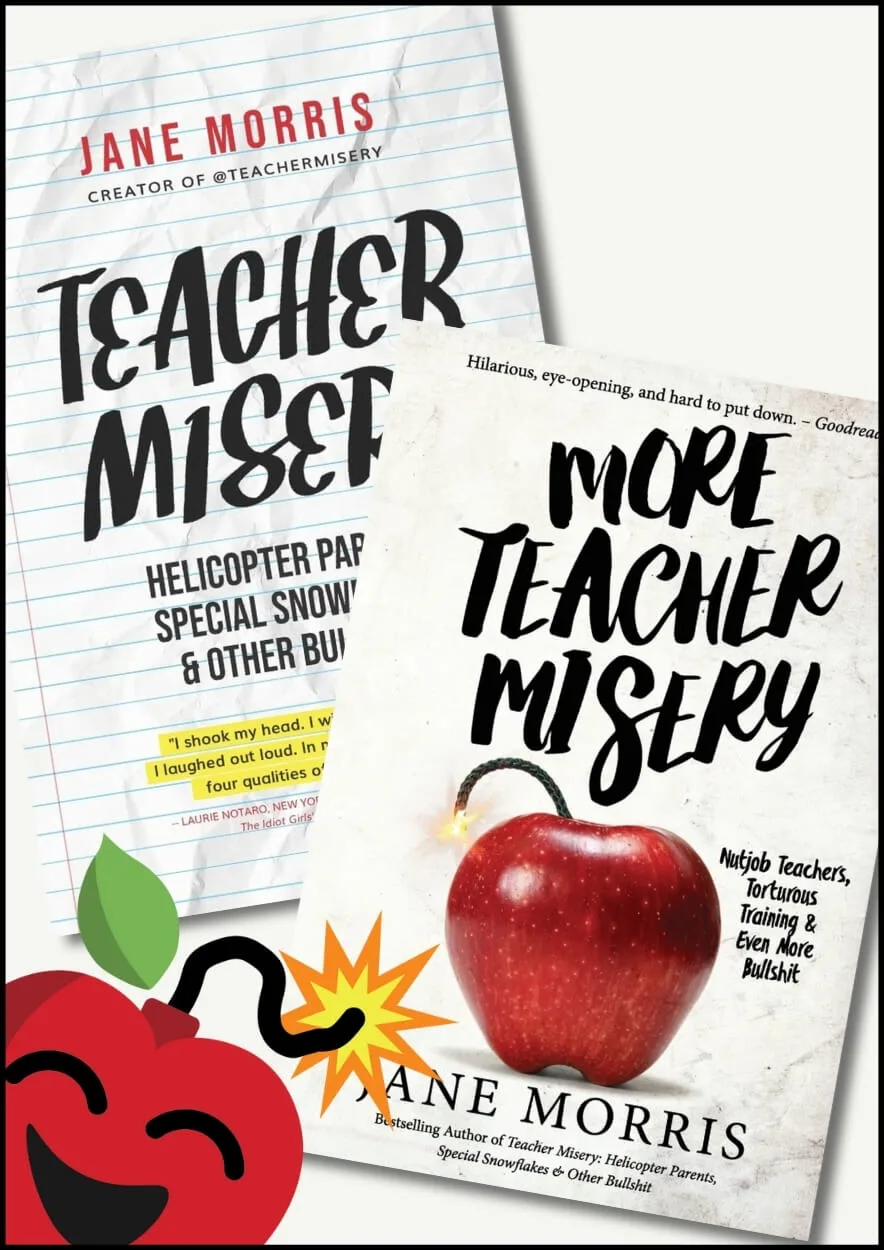Recently I decided to try to transfer to a school that’s closer to where I live. I didn’t prepare much for my first interview because I had over a decade’s worth of experience. The teacher interview questions they asked me were jam-packed with the latest educational jargon, and at times I couldn’t even decipher what they were asking me.
I bombed that first interview so badly that at one point I just started laughing. They looked at me like I was nuts. After that interview, I knew if I really wanted a shorter commute I would have to bone up on the crap. Here are some of the questions that showed up in my interviews and what they really were asking (which can tell you a lot about the school and its frequent problems).
Teacher Interview Questions
Below is a selection of popular teacher interview questions I’ve either been asked or are commonly asked. To spice things up, I’ve decided to break these questions down by translating what they are really asking and how I want to answer them.
(Spoiler alert: I want to be snarky and point out how ridiculous half of these questions are when there is a teacher shortage nationwide.)
Get the Books That Started It All
Before the blog, the podcast, the merch store… there were the best-selling books.
If you like the content on this site, then you’ll LOVE the Teacher Misery books. They’re jam-packed with teaching insanity, ridiculous true stories, and all the commiseration about the profession you’ve come to know, adore, and respect.
Follow the links below to get your copies today!

How Do You Use Data to Inform Your Teaching Practices?
What they are really asking: Please throw out as many educational buzzwords as you can in the next two minutes: Ready? Go!
How I want to answer: I look at my grade book, and the kids who have grades below 60% are failing. I know that this is most likely due to a severe lack of effort on the student’s part. I prepare for the onslaught of emails and phone calls from those students, their parents, and even administration requesting that the student be given every opportunity to pass, even if that means just giving them points for no reason.
How Proficient Are You With the Latest Classroom Technologies?
What they are really asking: Can you use PowerPoint and Google classroom? Are you going to annoy people with dumb internet questions?
How I want to answer: I can use PowerPoint and Google Classroom. I am usually the one who gets inundated with dumb internet questions from others.
How Do You Handle Students Who Are Consistently Tardy or Absent?
What they are really asking: We have absolutely no consequences for tardies and absences so how will you make it appear that there is some kind of consequence?
How I want to answer: I will mostly ignore it, but sometimes I will get really mad and yell.

How Do You Differentiate for ESL Students? Gifted Students? Special Needs Students?
What they are really asking: We are going to take kids with every possible ability level and shove them into one class. Is that okay? Will you complain about this and say it’s a bad idea? We don’t want feedback. We want compliance.
How I want to answer: That sounds like a really bad idea, but it’s worth a shorter commute, so whatevs.
How Would You Handle a Situation with an “At Risk” Child and Unreceptive Parents?
What they are really asking: We have no consequences for students who are disrespectful, belligerent, and out of control. If you call home, the number will most likely be disconnected, or the mom will yell at you that this is not her problem. Do you have the patience for this shit?
How I want to answer: Yes, I am on several anti-anxiety meds for this very scenario. I am armed and ready with indifference!
Describe a Recent Professional Article or Book You Have Read and How It Informed your Teaching Practices.
What they are really asking: The time has come to bullshit us to the point of no mercy! Show us that you read online what an interviewer might ask you! We really get off on that sort of thing!
How I want to answer: This is obviously a joke question because if I had any extra time, I certainly wouldn’t spend it reading articles written by people who have never actually been in the classroom. Next question.
What Courses Have You Taken Recently for Professional Development (Besides Those That are Mandatory) and What Have You Learned from Them?
(Note: this is the question that caused me to laugh hysterically at my first interview)
What they are really asking: Have you been desperate enough to take all those extra shitty courses for that pathetic little salary increase?
How I want to answer: It ain’t worth an extra ten bucks a check. I’ll make coffee at home four mornings a month instead.

How Do You Motivate a Student Who is a Reluctant Learner?
What they are really asking: We have lots of kids who don’t give a rat’s ass about school or life in general. Will you let them sleep in class or will you wake them up and deal with their shit?
How I want to answer: Usually I will let them sleep, for the sake of my sanity. Occasionally, when I am feeling ambitious, I will wake them up and ask them if they are going to do something. But mostly I just slip worksheets under their drooling face.
How Do You Use Scaffolding in the Classroom?
What they are really asking: Do you know what this word means? It sounds fancy, but it’s really not.
How I want to answer: Yeah, I read that this means “steps.” I do use steps leading up to an assignment because I’m a teacher and that’s what we do.
Why Do You Want to Work at Our School Specifically?
What they are really asking: Did you look at our website five minutes before this interview and memorize a few facts?
How I want to answer: I want to work here for the simple reason that it will shave 25 minutes off my commute and save me about $30 a week in gas.
Describe Your Classroom Management Style.
What they are really asking: Can you handle buck wild students yourself or are you going to be sending them to us all the time?
How I want to answer: I know not to send them to you. I try everything in my power to get them to pay attention and then I usually just give up.

What is Your Ideal Vision for PLCs (Professional Learning Communities)?
What they are really asking: Once or twice a week we are going to force you to meet with other teachers. How much are you going to complain about it?
How I want to answer: My ideal vision of PLCs is to go back to a time when they did not exist.
Do You Have Any Questions For Us?
What they are really asking: We would now like to judge you based on your response to this question about questions. We will give you a short, irritated answer for each of your questions. However, if you don’t ask any questions, we will be suspicious of you and wonder why you couldn’t come up with a question.
How I want to answer: I wish I knew what you wanted me to ask. I know there is a perfect question, but like the holy grail of interview responses, I fear I may never discover it.
Buy Some Merch · Support the Site!
Teacher Misery is by the teachers and for the teachers. Our mission to improve the lives of teachers everywhere.
If you’d like to support the cause, buy yourself (or the burnt-out educator in your life) a gift from our merch store. And, YES, they are all as sarcastic as you’d hope. 😉
Every dollar supports the commiseration!

Preparing to Answer Teacher Interview Questions
Teacher interview questions are a hot topic among teachers. Interviewers love to pack buzzwords and teacher jargon into all their interviews. The key to getting a job in a school or district you’re gunning for is to go into a teacher interview prepared!
Here are a few pieces of advice from teachers who recently sat on an interview panel at their school:
- “We asked, ‘What would you do if a parent emailed and wanted to know why their child got a 97 instead of a 100?’ Most people think it’s a joke but it’s a regular occurrence at our school and should tell you something about the kinds of parents you’ll be dealing with.
- “They asked applicants, ‘In what ways will your students be able to contribute to a 21st-century society?’ I’m not entirely sure what answer they were looking for. Something about technological fluency or something.”
- “We asked each candidate, ‘What is the biggest problem in education right now?’ They were pretty much looking for answers that related to things that the teacher could address in the classroom, and nothing too big, philosophical, or ideas that would require admin. to get involved.”
- “I’d read up on the Science of Reading if you are teaching at an elementary level, be ready to explain how your classroom management plan works, and also how you plan to communicate with the families of your students.”
- “Check what extracurriculars are open and express interest in doing one, like running a club. More and more schools want a package deal. How can you be a part of their community?”
- “You are interviewing them, too – asking them about their school’s greatest strengths and growth areas (and how they’re addressing those growth areas) will tell you what they value. For example, if they talk about standardized testing and their efforts at improving test scores (which is/can/should be different than student achievement), it’s likely you’ll be expected to value test scores too; they’ll want their values to become your values too, so be honest with yourself about what does/doesn’t resonate with you before making a decision.”
- “When I was on a couple of interview committees, the following question was always asked, ‘What makes a good teacher but a bad employee?’ Or the reverse question, ‘What makes a bad teacher but a good employee?’ You’d be surprised at how many couldn’t separate the two. They were looking for things like: you can show up on time every day but fail to make relationships with kids, or you can gossip to other teachers about other teachers but still have high test scores and good relationships with kids. Silly, but it was a make-it-or-break-it question.”
- “Research what types of standardized testing they use, what special programs they have (Advanced Placement, Dual Enrollment, honor level courses in middle or high school) and explain that all students can learn. Know what a 504 plan is. You will be asked how you’ve handled previously difficult situations.”
- “As someone who has sat on the interview committee for several years, be prepared for the dreaded extracurricular question, especially if you are interviewing for grades 6-12. We basically hired two teachers this year based on their willingness to take specific extracurricular activities. Everyone was equally qualified, but the ones who showed a willingness to fill an empty extra were the ones that were hired. I hate it, but it’s always the sports that matter the most in rural/suburban schools.”
- “We always ask them to describe a lesson they are proud of or that went well.”
- “We ask a lot of questions about classroom culture, not even content areas. One question is ‘If a student comes to class and tells you that they don’t have a pencil, what would you do?’”
- “The panel asked if the teachers union is negotiating for increased salary but that means that the district has less money for students, would you vote for a salary increase? Obviously, they want you to pick the students over the raise.”
- “You will be asked about classroom management style, what learning would look like in your classroom, and your experience teaching the specific grade level of the position. They might ask how you make sure that students of all races and backgrounds are treated fairly/feel safe and included, or something along those lines.”
- “I’ve sat in on a few interview committees this year. They are definitely asking about PLCs (professional learning communities) and how you see yourself participating in them, how you address the needs of culturally and linguistically diverse students, and to tell about a time you handled a difficult situation in the classroom.”
With teacher shortages as serious as they are right now, you would think these interviews would be a lot less intense. But unfortunately, admin. still needs to feel fancy and important, so they will continue to ask a ton of teacher interview questions such as these.

